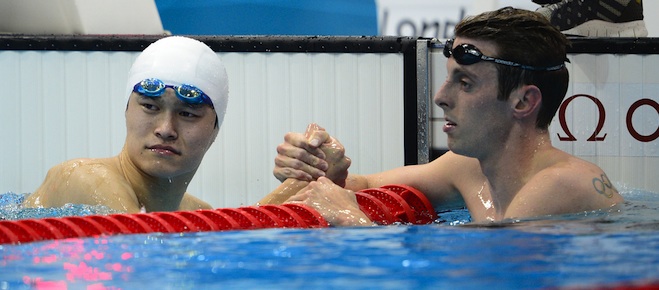Ryan Cochrane: Four years, one second, and a silver medal
‘I was second place,’ says Ryan Cochrane, ‘but I showed that I’m progressing.’
China’s Sun Yang (l) shakes hands with Canada’s Ryan Cochrane (R) after he won gold in the men’s 1500m freestyle final during the swimming event at the London 2012 Olympic Games on August 4, 2012 in London. AFP PHOTO / LEON NEAL (Photo credit should read LEON NEAL/AFP/GettyImages)
Share

It is a memory that has bothered Ryan Cochrane for the last four years. Those final, lung-bursting lengths of the pool during the men’s 1500m swim. The indescribable pain that built up over the course of the 15-minute race and eventually overwhelmed him, allowing Oussama Melloui of Tunisia to catch and then pass him on his way to Olympic gold. And even though the then 19-year-old held on for a bronze, finishing second to the great Australian distance swimmer Grant Hackett, the experience was somehow tainted for him. Cochrane could be philosophical about not being the fastest, but he couldn’t accept not being his best.
So in the run-up to London 2012, the Victoria, B.C. native hatched a simple plan: he would embrace the pain, make it his friend, instead of his enemy. And learn to cherish the thing that he feared most.
Training became all about “pushing myself beyond my means and knowing that feeling,” he says. After churning out set-after-killer-set, he would sit on the pool deck, dizzy and exhausted, and relish the feeling. “So I would know that when I got to race day that nothing was going to be that hard.”
And at a Canadian swim team training camp in Hawaii in early July, he set himself a rather unpleasant goal—to work so hard as to make himself throw up. Three times. In the end, he only puked twice but it was enough to satisfy. In London, everything would be left in the pool. Figuratively, and if necessary, literally too.
The good news is that lunch stayed down. The better news for Canada is that Cochrane came second, and for once he was happy about it. In a race that China’s Sun Yang dominated, shaving a full three seconds off his own world record, Cochrane made a mark of his own, swimming the distance a full second faster than he did in Beijing, without the aid of a high-tech bodysuit. And not only did he secure Canada’s first silver medal in the pool since the 1996 Atlanta Games, he held off a late charge by Mellouli relegating the defending Olympic champion to bronze.
“When he passed me in Beijing, I wasn’t expecting it. But today I was. And I was going to fight—probably til the death—to make sure he didn’t get me,” a smiling Cochrane explained, the silver hanging from his neck. The agony that he had experienced at the 1100 metre mark in Beijing—when he feared he might die with eight full lengths of the pool remaining—came at the 1300 metre mark this time, when there were only six lengths left. And in Ryan Cochrane’s world, this is a big improvement.
It gives him hope that he might soon be able to challenge Sun Yang, instead of follow in his wake. “When I was young, I thought I could do anything,” the 23-year-old explained endearingly to a cluster of middle-aged journalists. “But then the years go by and you keep getting second place, and you start to think maybe this is the best I can do. Well I was second place, but I showed that I’m progressing.”
The 6-foot-6 Chinese swimmer—who also took gold in the 400m freestyle race, silver in the 200m, and a bronze as part of the 4 x 200 Free relay team—had his own take at a post medals press conference. Despite finishing more than eight seconds faster than Cochrane—in 14:31.02 versus 14:39.63—he was holding back. “I still had a reserve. I did not push my body to the limit.” And for those who will suggest that his dominance since his sudden emergence on the world scene a little more than a year ago is somehow suspicious, he had a pointed message. “Many people think China has so many medals because of doping. But I can tell you, it is because of hard work.” Then he declared that China “is not weaker than the U.S. and other nations” and all the Chinese journalists in the room applauded.
Compared to Beijing, Cochrane did seem to enjoy his moment in the spotlight, smiling broadly during the medal presentation and waving to the crowd. He even threw his bouquet up to his mother Donna in the stands, dressed in a Go Ryan Go t-shirt with his face printed on the front. Just like his dad, John.
But the indelible memory of the men’s 1500m competition in London was the sight of Yang strutting off the pool deck, with a Chinese flag wrapped around him like Superman’s cape, and the gold bouncing off his massive chest. He burped and then patted his stomach. Like a movie monster who has just devoured a city, and is still hungry for more.